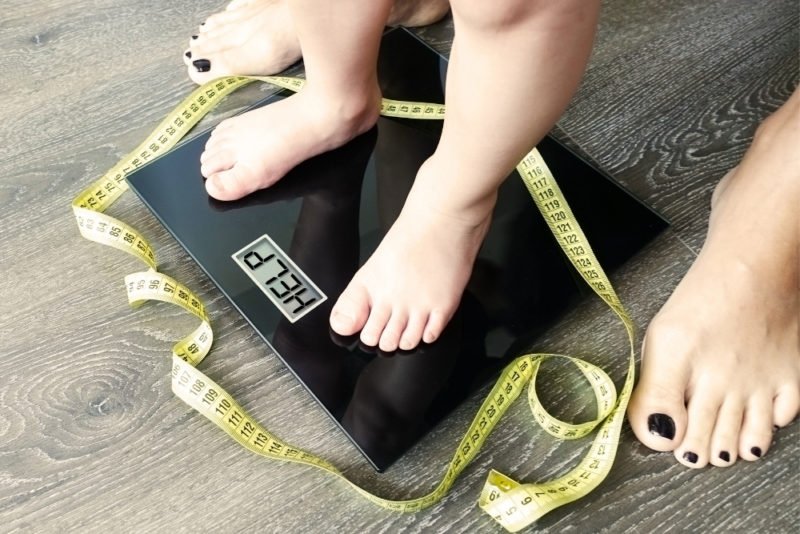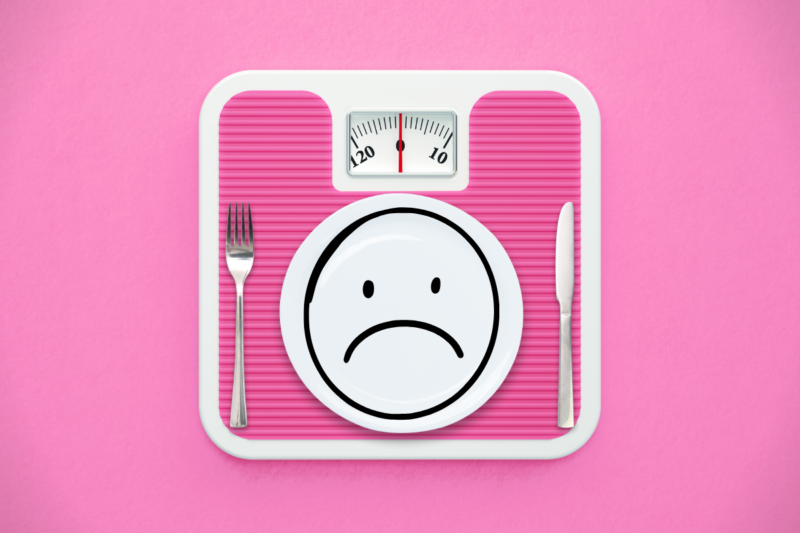
A few years ago, I was on a case consultation call with Evelyn Tribole, a fellow registered dietitian and co-author/co-creator of “Intuitive Eating,” when she said three words that made me go, “Ohhhhhhhhhhhh!” They haven’t left my head since.
Those words? “Non-consensual dieting.”
The context of this conversation was a client who was put on her first diet when she was eight years old. I wish this was my only client who had been put on a diet without their consent when they were a child, but sadly, it’s not. This is unfortunate on many levels.
- Being told that your body is wrong at a young age is laying the groundwork for a lifetime of body hatred.
- Being forced to restrict food and possibly also participate in enforced physical activity take away agency and ownership in our own bodies—again, at a young, vulnerable, age.
- Indoctrination into the idea that to be acceptable you have to shrink or modify your body.
The Project EAT (Eating Among Teens and Young Adults) research out of the University of Minnesota is one research study shining a light on the harms of early life dieting.
Now, there are lots of things that kids have to do that they may not consent to. Getting shots. Going to the dentist. Going to school when they have to give a book report. Sitting in the back seat without pinching their sibling while on a long car trip. But while those things may make for some unpleasant memories (perhaps with laughter thanks to the perspective of adulthood), they don’t do damage the way that non-consensual dieting does.
This loss of positive embodiment, the lessening of your ability to feel at home in your body, has serious ramifications.

Shedding the mantle of shame
My master’s thesis in grad school was on a weight loss intervention for kids. I chose this project at a point where I was still immersed in diet culture and thought that my life’s purpose was to help other people lose weight.
Ironically, I was shifting to a non-diet perspective as I was working on my thesis, listening to hours and hours of recorded sessions with the child, their parent, and a therapist. Parents had been instructed to praise their kids for engaging in healthy behaviors, such as making “good” food choices or participating in physical activity. They were not supposed to praise them for weight loss. My job was to note any instances of verbal praise.
I remember my father visiting shortly after I finished my thesis. He asked me if the kids in the study had been bullied at school because of their weight. I said I didn’t know, because I didn’t have direct contact with the kids, but it would be reasonable to expect that many of them were (because, hello, we live in a freaking anti-fat society).
My dad said, “Well, I guess that’s a good thing, because it probably motivated them to lose weight.”
I have never had to (metaphorically) bite my tongue as hard as I did at that moment. If I was a cartoon character, steam would have been coming out of my ears. When I spoke, I was very, very firm, and I think I deserve an award for not screaming at my father. I said, “Bullying and weight-shaming is never, ever, EVER an effective motivator for positive change!”
In fact, shame keeps you stuck, at best, and contributes to poor self-care and — when weight is the source of shame — to disordered eating habits.

The road to disordered eating
I ask all my new clients about their dieting history, including how old they were when they first attempted to lose weight, and how long ago their most recent diet was. I also ask questions about their childhood food environment.
- Was their body subjected to criticism, and by whom?
- Did their parents try to put them on a diet, or monitor their weight?
- Were there different food rules for them than for other members of the household?
- Did they sneak food or engage in secret eating?
Sadly, most of my clients answer yes to all those questions. And generally the sneaking food or secret eating began after the rest.
When a child feels shame and has no idea how to cope with those feelings, it’s not surprising when they turn to food. (And thank goodness they choose food instead something harmful such as cutting or drug or alcohol use.)
If a child is hungry, but they’re not allowed to have a snack or have seconds at dinner or eat enough of the first serving to be satisfied, then it’s not surprising when they sneak food and eat it when no one’s looking. And the act of secret eating can take on a life of its own, becoming as more about rebellion or even morphing into binge eating disorder.
If a child is not allowed to have favorite foods, then it’s not surprising when they wolf them at parties, buy them with their allowance, and put them on a pedestal. Forbidden fruit tastes the sweetest, after all. Time and time again, I watch people who are grown-ass adults finally make peace with foods that were held off limits as kids — having them openly, no sneaking required — only to find out they don’t actually like them anymore. Yet those foods had held their forbidden allure for DECADES.

Scapegoating the body
I get tired of research showing that fat kids are more likely to suffer from depression, especially when that research doesn’t factor in whether these kids are subjected to weight-based stigma or bullying from their parents, their pediatrician, kids at school. I’ll bet that they are, and the answer should not be that a child has to try to change their growing body in order to not be treated like crap.
Don’t blame weight, when it’s society’s opinion on weight that’s the real problem. Don’t make the body a scapegoat.
Kids of all body weights benefit from being active in ways that appeal to them, whether it be active play or actual sports. They also benefit from eating a variety of nutritious foods, and from feeling safe, loved and respected. I wrote about this a few years ago for The Seattle Times when I was all fired up about WW (Weight Watchers) offering free memberships to teens, all the better to indoctrinate them into diet culture.
I myself was indoctrinated into diet culture by way of Weight Watchers non-consensually (my father made me go) when I was 16, so I know whereof I speak. I have one client who was introduced to Weight Watchers when she was in fifth grade. She says she learned all sorts of disordered techniques from listening to the adult women in the meetings, providing great fuel for her eating disorder.
Dieting is an assault on the body that has lasting repercussions. Kids should be taught to trust their bodies — about food, and just generally. A girl who is taught that her natural body cues can’t be trusted may someday not listen to her intuition that she needs to get away from a boy who is pressuring her sexually.

Questions and reflections for breaking free
Were you put on a diet when you were a child, adolescent or teen? Non-consensual dieting is a hard legacy to break free of, especially if it effectively led to a lifelong pursuit of an “acceptable weight.” Here are some questions to reflect or journal on:
- How do you reckon with the fact that you were indoctrinated into dieting before you were of the age of consent? (This question makes the most sense if the idea of consent around dieting is brand new to you.)
- How do you deal with the harms dieting has caused, and the programming that your body is not enough?
- If you feel anger or loss, but you know that your parents thought they were doing the right thing, how do you reconcile those two things? How do you acknowledge their good intentions while honoring the impact it had on you, and doing the work to repair the damage of that impact?
One of my favorite episodes of cookbook author Julia Turshen’s podcast is the one where she interviewed Evelyn Tribole. Midway or so into the conversation, Julia mentions that even though she doesn’t have kids, she read the chapter in “Intuitive Eating” on the raising an intuitive eater and imagined what it would be like to have been raised that way. I often talk to my clients about “reparenting” themselves, but I honestly never thought about that particular chapter being a useful reparenting tool. Now, I recommend that chapter, and I sometime even recommend the book “How to Raise an Intuitive Eater.” Sometimes, we need to retrace our steps to allow the healing to begin.
This post contains Amazon Affiliate links. As an Amazon Associate I earn from qualifying purchases.
Disclaimer: All information provided here is of a general nature and is furnished only for educational purposes. This information is not to be taken as medical or other health advice pertaining to an individual’s specific health or medical condition. You agree that the use of this information is at your own risk.
Hi, I’m Carrie Dennett, MPH, RDN, a weight-inclusive registered dietitian, nutrition therapist and body image counselor. I offer compassionate, individualized care for adults of all ages, shapes, sizes and genders who want to break free from eating disorders, disordered eating or chronic dieting. If you need to learn how to manage IBS symptoms with food, or improve your nutrition and lifestyle habits to help manage a current health concern or simply support your overall health and well-being, I help people with that, too.
Need 1-on-1 help for your nutrition, eating, or body image concerns? Schedule a free 20-minute Discovery Call to talk about how I can help you and explore if we’re a good fit! I’m in-network with Regence BCBS, FirstChoice Health and Providence Health Plan, and can bill Blue Cross and/or Blue Shield insurances in many states. If I don’t take your insurance, I can help you seek reimbursement on your own. To learn more, explore my insurance and services areas page.






